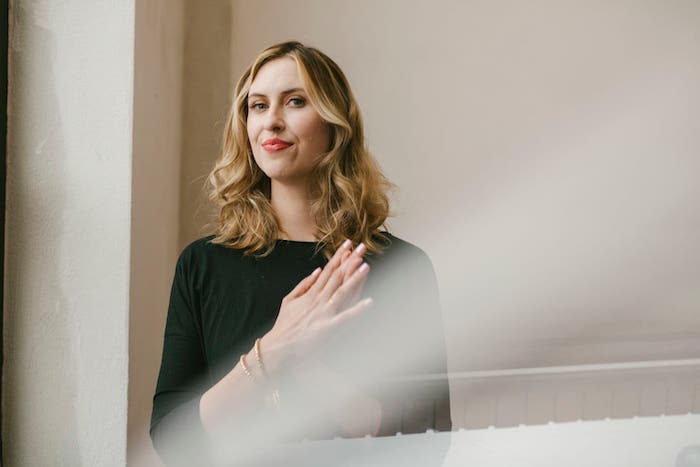Now she’s helping others explore grief.

By Marjorie Brimley
Tears spill down Nora McInerny’s face as she stares at the recording studio’s ceiling.
“That was when the doctors told her the cancer was going to kill her,” the interviewee is saying.
“Wow,” McInerny says, letting the word rest in the air. The pause stretches far beyond a comfortable one. McInerny has a pained look on her face, yet she appears every bit the polished modern woman: her blond hair is curled, her red lipstick is still in place and there is a scarf tied in a perfect knot around her neck. In another studio, she could be working on a show about the latest fashion trends or young women in the workplace.
Instead, she’s hosting a podcast about the horrors that face humanity: cancer, suicide, sexual abuse, mass shootings.
Welcome to “Terrible, Thanks for Asking,” the podcast about “the complicated nature of difficult experiences,” as McInerny says.
Each week, the podcast digs deep. It allows listeners to think about the pain we live through, how we face it, tackle it, collapse under its weight. It gives permission to grieve, to go on living, to be happy and sad simultaneously. It’s about everything that life can throw at us and the myriad ways in which we must reimagine our lives. As McInerny writes in her newest book, “No Happy Endings: A Memoir,” “death is not the only time we start over
And McInerny is an expert in the subject.
“Terrible, Thanks for Asking” and all that has come after was born out of McInerny’s own grief. She launched it in 2016, as a 33-year-old single mom, just two years after losing her first husband, Aaron Purmort, to brain cancer. Weeks before Aaron died, she also suffered a miscarriage and watched her father die.Aaron’s obituary, which they wrote together, went viral, and people began contacting McInerny. “So many people . . . were reaching out to me, a complete stranger, in the middle of the night to talk about the worst thing that ever happened to them, and it wasn’t because they were all friendless or familyless,” she remembers. “It was just because the people around them were afraid to talk to them or didn’t want to remind them of their tragedy.”
Episodes include guests such as a young man with cerebral palsy; a woman who almost died in a fire that killed her boyfriend; an emergency-room doctor who watched her husband die in the hospital where she works.
Each story is filled with almost-unspeakable pain. And yet, the podcast has been listened to more than 14 million times.
Sitting on her couch recently in Minneapolis, McInerny recalls those early days after losing Aaron. As she talks, she looks at a wall-size photograph of the two of them holding their young son, Aaron’s adoring gaze forever watching over the bustling living room, so full of life.
Just then, McInerny’s husband, Matthew Hart, walks in holding their youngest child, who they affectionately call “baby.” Her 6-year-old, the one who calls Aaron “Dad” and Matthew “Matty-daddy,” runs in dressed like a shark, and she laughs. Two teenagers, Matthew’s kids from his first marriage, coordinate pickup from soccer practice that afternoon. McInerny’s mother shows up and begins chatting with Matthew and playing with the younger kids. And, of course, there’s a family dog.
The chaos and love surrounding McInerny is a perfect representation of her life.
“I do think most families are complicated and built from all of these fragmented other places, but we’d rather not think of it that way,” she says. Her family, in fact, isn’t just her new husband and their kids. It also includes Aaron’s family, especially his mother, whom she communicates with often. McInerny admits in her new book that she and Aaron’s mom initially “couldn’t do the grief together,” but now her family of six spends part of every winter break visiting her. “Aaron’s mother buys all the kids Christmas presents,” she says, “and they all call her May-May.”
The life that surrounds her is full of many positive things. Yet when she cries about Aaron with people outside her inner circle, she says, it can be a bit disconcerting to them. She understands that society believes she should be either happy or sad, but not necessarily both. “I think that most families hold both sad and happy feelings, and I don’t think I would have known that or assumed that before. In fact, I know I wouldn’t have.”

When Aaron was dying, the couple formed a nonprofit organization, Still Kickin, that gives no-strings-attached grants to people who are struggling. One recipient, a domestic violence survivor named Andi, recalls how the grant helped her move and support her family “during a very dark time.” This grant was “a bright light to me amidst so much darkness.”
After Aaron died, she started the Hot Young Widow’s Club, an online group, where thousands of young widows and widowers voice their struggles and triumphs. In those first months after Aaron’s death, she wrote the book “It’s Okay to Laugh: (Crying Is Cool Too)” and started the podcast. “No Happy Endings” came out in late March. This spring, she is touring with “Terrible, Thanks for Asking.” (The show comes to D.C.’s Sixth and I on May 30.) McInerny is also launching “Nora Knows What to Say,” an advice series from The Lily, a publication of The Washington Post.
Even with such demands on her time, McInerny tries not to compromise her home life, going to the gym with her teenagers or snuggling on the couch with her little ones. Her work with grieving people lives alongside an otherwise normal life.
McInerny’s goal is not to sensationalize death and tragedy. “I know how it feels to just be somebody’s sad story. Nobody wants to be a sad story,” McInerny says. Instead, she aims to make a show that is about understanding the complex mix of joy and pain experienced by one person.
This means that if she’s doing a story, for example, about two law enforcement officers whose baby died of SIDS, she doesn’t spend weeks researching the various causes of infant death. Instead, she tries to understand an individual story. So McInerny lets the bereaved family talk with little interruption. The mother speaks through tears as she recalls seeing her husband the moment after tragedy hit. “All I could think of was hold it together,” she says, “because your husband just watched our son die.”
In these interviews, McInerny provides narration and a frame from which to view the story. In another episode, she interviews a Hmong woman named Yer Vu who was widowed, became a refugee and fled to the United States with three young children. “I carried [my youngest son] on my back,” the woman recalls as part of her harrowing tale of escape which also involved fording a river in a war zone. “If there was no God, maybe we would have died,” Yer Vu says.
There is a slight pause, and then the listener hears the voice of McInerny. “Yer Vu credits God,” she narrates, “and I credit Yer Vu. Because that is more motherhood than I have or will ever do in my entire life.”
Her authenticity has brought some unexpected voices to her podcast, such as Nation Hahn, who was drawn to the podcast because he felt she could tell his story in a way that other media had not. His episode, which focuses on how he processed the murder of his wife while being simultaneously thrust into a media spotlight, gave him a platform to tell his whole story. “I admire [McInerny] for her tenacity and willingness to explore tough issues while building community,” Hahn says. “As someone who is still very much experiencing grief years later, ‘Terrible, Thanks for Asking’ offers a path forward, helpful advice, and reminds me that I am not alone in the face of this terrible loss.”
McInerny says her goal is to promote empathy instead of pity. So even though the topics she covers can be quite grim, the show itself is not. She laughs often while talking to guests and usually gets them to laugh, too.
“I don’t want the show to be a relentless bummer,” she says. Still, she believes in the importance of facing difficult subjects head-on. “We do a really good job, especially the U.S., of making sure we avoid everything uncomfortable,” McInerny says. But running from pain is impossible, because “it will catch you eventually. So you might as well be open to the experience and open to witnessing those experiences in other people because someday something terrible is going to happen to you or to someone you love. Actually, that’s a guarantee.”
But why continue to immerse herself in tragedy when she’s already been through so much loss?
“Sometimes, I don’t want to do it,” McInerny concedes, but then there are times when she feels inspired by the stories she hears. Moreover, she wants these conversations about death and loss and hardship to become more commonplace. Notes from listeners explain how she may have an even wider impact than she initially imagined.
“I think you saved my life tonight,” wrote a man named Jim who told her he had been struggling with depression. “You kept me awake tonight, and now I know tomorrow will be better.”
McInerny recognizes that letting in all of this pain is difficult for most people. In fact, she found it really hard to engage in such discussions before she had to face her husband’s cancer and death. She knows that it might be impossible for her to ever really understand what grief feels like for someone who has experienced a different tragedy. “But at the same time,” she says, “very untimely and tragic death does give you some sort of access to each other.”
Maybe this is what makes her so effective at getting people to open up about their lives. Or maybe it’s just that McInerny has that certain touch — the one that helps people tell the entirety of their stories, rather than be reduced to a simple anecdote.
The topics she tackles may be difficult, but, she says, “These are things that everybody has always been trying to connect over since the dawn of time, right? The few things that we all have in common are love and want and death.”
Complete Article ↪HERE↩!
